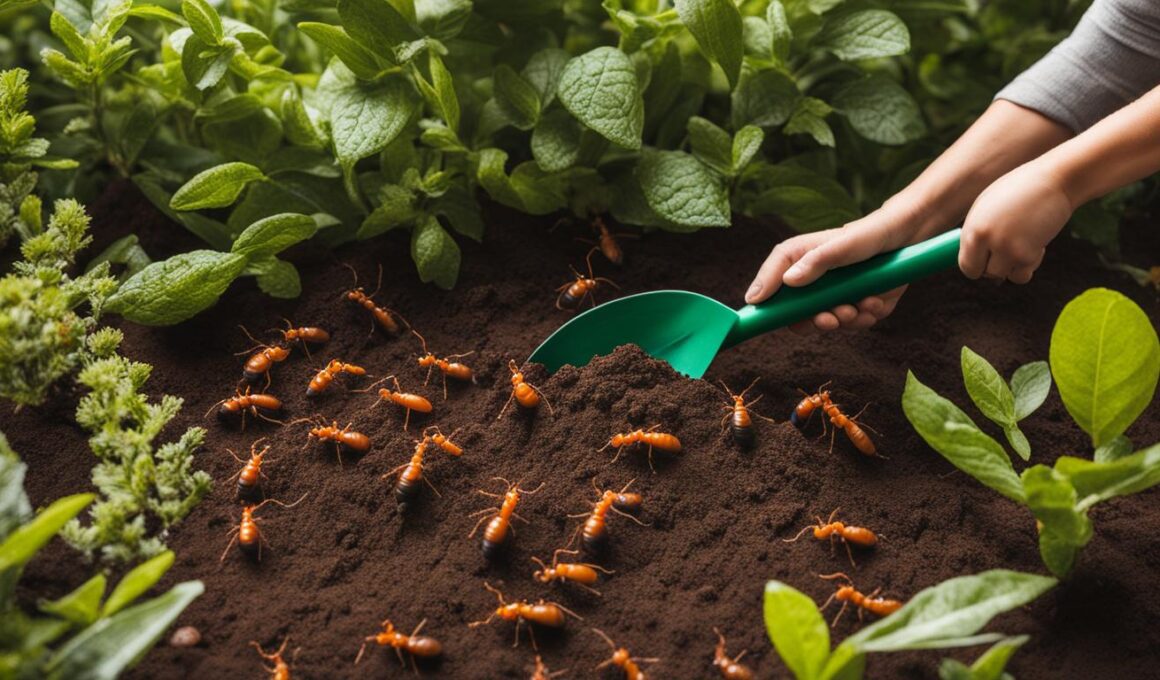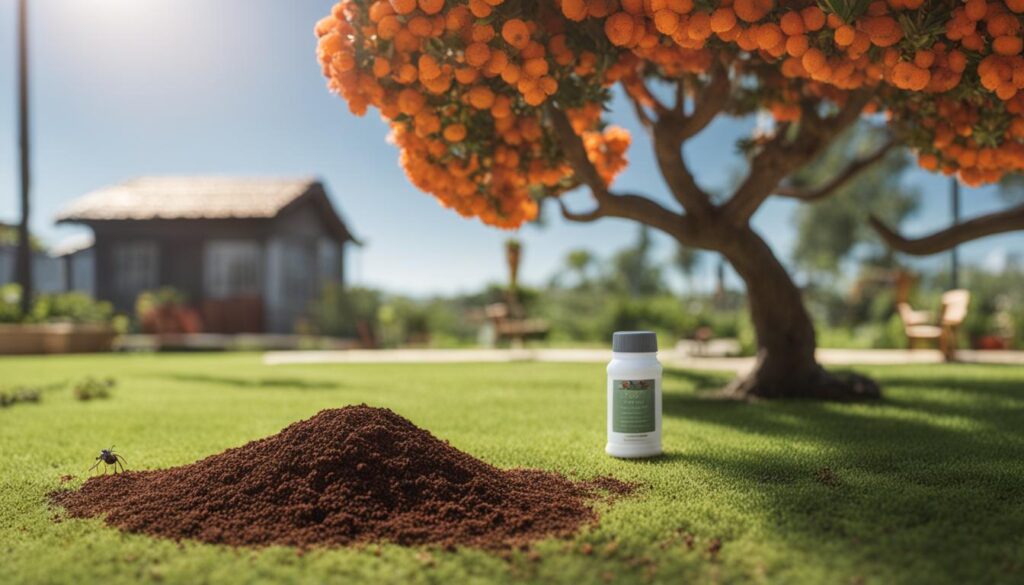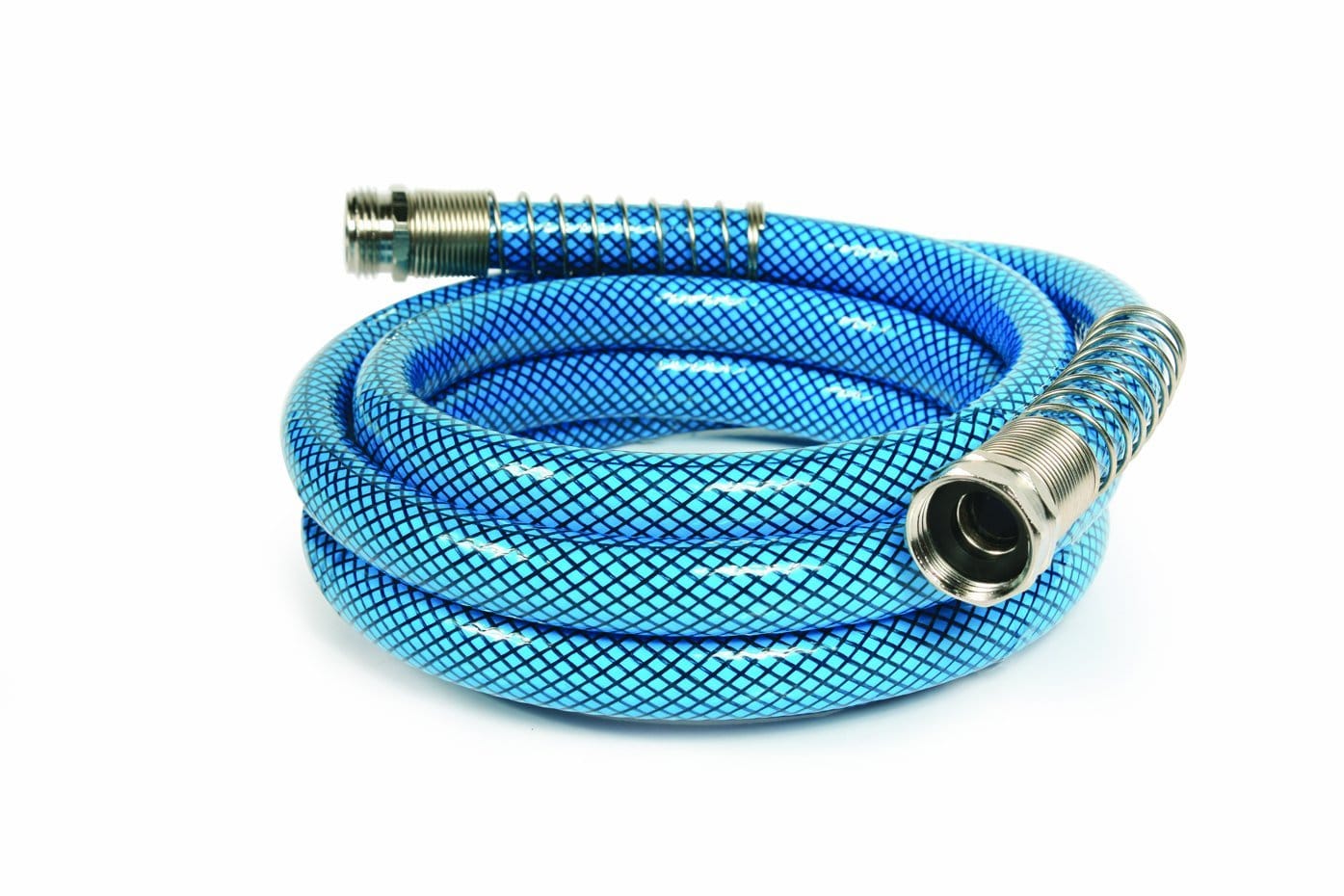Springtime is the ideal time to address ant invasions in your yard to prevent them from entering your home. Understanding ant behavior and targeting the ant colony’s queen are key to effective eradication. Ants are attracted to food and water sources, so reducing moisture and eliminating food waste are important preventive measures. Planting trees and shrubs that reduce yard moisture and installing a drainage system can help keep ants at bay. Eco-friendly methods like essential oils, black pepper, baking powder, boiling water, vinegar, and lemon juice can deter ants naturally. If home remedies are not sufficient, chemical pesticides and professional pest control services are other options.
Key Takeaways:
- Understanding ant behavior and targeting the queen ant are crucial for effective eradication.
- Reducing moisture and eliminating food waste can help deter ants from your yard.
- Eco-friendly methods like essential oils, black pepper, baking powder, boiling water, vinegar, and lemon juice can naturally repel ants.
- Chemical pesticides and professional pest control services are alternative options if home remedies are not sufficient.
- Maintaining a healthy yard, keeping food and water away, and taking preventive measures can help prevent ant infestations.
Understanding Ant Behavior and Colonies
Ant colonies are composed of worker ants and a queen ant. It is important to note that simply killing worker ants may result in the formation of new colonies. The queen ant is the lifeline of the colony, so it is crucial to target her for effective eradication. Ants are naturally attracted to sources of food and water, particularly damp areas and garbage cans.
Signs of an ant infestation include the presence of ant trails, increased activity around food sources, and visible anthills. To deter ants from your yard, it is recommended to maintain a healthy and fertilized lawn. Additionally, keeping compost bins away from the lawn, removing dead limbs and decaying matter promptly, and cleaning up spills can help discourage ants from establishing colonies in your yard.
By understanding the behavior of ants and the structure of their colonies, you can implement targeted strategies to effectively control and prevent ant infestations in your yard.
Eco-Friendly Methods to Kill Ants
When it comes to dealing with ants in your yard or home, eco-friendly methods can effectively eliminate these pesky pests without harming the environment. By using natural substances and ingredients, you can kill ants and prevent them from returning. Here are some eco-friendly methods to control ant infestations:
- Essential oils: Peppermint oil can be a powerful ant repellent. Dilute a few drops of peppermint oil in water and spray it directly on ants or on ant trails. The strong scent of peppermint will deter ants from entering your home. Be aware that larger infestations may require larger quantities of essential oils.
- Black pepper or cayenne pepper: Sprinkling black pepper or cayenne pepper on ant trails and anthills suffocates ants and prevents them from passing through. This natural method is an effective way to kill ants without the use of harmful chemicals.
- Baking powder: Often found in your kitchen, baking powder can be an unsuspecting weapon against ants. When ants come into contact with baking powder, it enters their exoskeletons and blocks the airways, leading to their eventual demise.
- Boiling water: Pouring boiling water directly on ant trails and anthills can be a quick and effective way to kill worker ants and the queen. While this method may eliminate the existing colony, survivors may create new colonies, so it’s important to monitor the area for any signs of reinfestation.
- Vinegar or lemon juice: The acidic properties of vinegar or lemon juice can burn ants’ exoskeletons, causing harm to the insects. Simply pour vinegar or lemon juice directly on ants to kill them and deter others from approaching.
If you prefer natural and eco-friendly solutions, these methods can be used to eliminate ants both indoors and outdoors. Remember that consistent and sustained efforts may be required, particularly for larger infestations. By implementing these eco-friendly methods, you can effectively eliminate ants from your yard and create a pest-free environment.
Chemical Pesticides for Ant Control
When it comes to effectively controlling ants, chemical pesticides can be a powerful tool. These pesticides, such as ant spray, are designed to kill ants on contact, delivering immediate results. However, it’s important to consider the potential risks they may pose to the environment and the grass in your yard.
Different forms of chemical pesticides are available for ant control, including dust, liquid, and bait traps. Bait traps are particularly effective as they attract worker ants, who then carry the poison back to the nest, ultimately eliminating the queen and the entire colony. On the other hand, sprays and dust work by swiftly killing ants upon contact.
When using chemical pesticides, it is crucial to select products that specifically target the queen ant. By eradicating the queen, you can effectively dismantle the colony. However, it’s essential to exercise caution when using chemical pesticides to minimize any potential harm they may cause to the environment and other beneficial insects.
The use of chemical pesticides should always be done with care and following the instructions provided by the manufacturer. Consider wearing protective gear, such as gloves and a mask, when applying these products to ensure your safety. Additionally, be mindful of any potential effects on children, pets, and other wildlife in the area.
Remember, chemical pesticides should be used as a last resort after exhausting all other alternatives. If you decide to use these products, do so sparingly and with careful consideration for the well-being of your yard and the environment.
Professional Pest Control Services for Ant Infestations
If home remedies and DIY methods are not effective in eliminating ant infestations in your yard, it may be necessary to seek professional pest control services. When dealing with large-scale ant infestations, local pest control companies equipped with specialized knowledge and tools can provide the expertise required to address the issue effectively.
Professional pest control services for ant infestations prioritize your needs and provide tailored solutions to eradicate the problem. Trained professionals will conduct a thorough assessment to identify the extent of the infestation and implement appropriate measures to eliminate the ant colony. By targeting the queen ant, they can ensure the complete removal of the colony.
It is important to choose a reputable pest control company that offers a satisfaction guarantee. This ensures that you have peace of mind knowing that the ant problem will be successfully resolved. By relying on professional pest control services, you can effectively eliminate ant infestations and create a pest-free environment in your yard and home.
Natural Ways to Repel Ants from Yard and Home
In addition to killing ants, it is important to prevent future infestations. By using natural repellents, you can create an environment that ants find less attractive and reduce the likelihood of reinfestation in your yard and home.
One effective natural repellent is essential oils. Tea tree oil, peppermint oil, and cinnamon oil can all help repel ants. These oils can be applied to areas where ants are frequently seen or used to create a barrier around your home.
Another simple and natural way to repel ants is by utilizing common kitchen ingredients. Cayenne pepper, black pepper, white vinegar, and lemon juice are all known to deter ants. Sprinkling these substances along ant trails or near ant entry points can help keep them at bay.
Planting mint around your home can also be an effective deterrent. The strong scent of mint can mask the odors that attract ants. Additionally, ants do not like the taste of salt. Adding small amounts of salt to problematic areas of your yard can help repel ants.
Finally, it is important to eliminate food sources that may attract ants. Keep sugary foods and breadcrumbs away from your lawn, as these are common attractants. Regularly clean up spills and crumbs, and ensure that food waste is properly disposed of.
By implementing these natural ways to repel ants, you can create a yard and home that is less inviting to these pesky pests and prevent future ant infestations.
Tips for Ant-Proofing Your Yard and Home
To keep ants away from your yard and home, it is essential to take proactive measures. By following these tips, you can create a pest-free environment and protect your property from ant infestations.
Maintain a Healthy Lawn
To make your yard less attractive to ants, ensure proper lawn maintenance. Regularly mow the grass at the recommended height, water the lawn adequately, and fertilize it according to the specific needs of your grass type. A healthy lawn not only enhances the overall aesthetics but also discourages ant infestations.
Relocate Compost Bins and Trash Cans
Ants are attracted to readily available food sources, such as compost bins and trash cans. To reduce the chances of ants invading your yard, place these containers away from the lawn, preferably in a clean, dry area that is inaccessible to ants.
Remove Plant Litter and Decaying Matter
Ants often build nests in areas with decaying organic matter, such as dead leaves, fallen branches, and plant litter. Regularly clean up your yard, removing any dead vegetation or decaying matter promptly. This eliminates potential nesting sites and reduces the appeal to ants.
Trim Trees and Shrubs Away from the House
Prevent ants from finding entry points into your home by trimming trees, shrubs, and bushes that come into direct contact with your house. By keeping vegetation at a distance, you minimize the chances of ants using branches or leaves as bridges into your home.
Clean Up Food Waste Immediately
Ants are attracted to food spills and crumbs left behind. To prevent ant infestations, clean up any food waste immediately, both indoors and outdoors. Wipe down surfaces, sweep the floor, and ensure that any leftovers are properly stored in sealed containers.
Minimize Water Sources
Ants seek out water, whether it be from leaky pipes, dripping faucets, or standing water in outdoor areas. Fix any water leaks promptly and eliminate stagnant water in your yard by ensuring proper drainage. By minimizing water sources, you make your home and yard less appealing to ants.
By implementing these ant-proofing strategies for your yard and home, you can effectively deter ants and maintain a pest-free environment. From maintaining a healthy lawn to eliminating potential food and water sources, taking these preventive measures will help you keep ants at bay and protect your property.
Can the Strategies for Ant Removal in the Yard also Work for Wasp Removal?
Yes, the strategies for ant removal in the yard can also work for wasp removal. By keeping the yard clean, using natural deterrents, and sealing up entry points, you can effectively repel both pests. Furthermore, you can find affordable wasp removal cost options from professional pest control services.
Conclusion
Ant infestations in yards can lead to problems indoors, so it is crucial to take proactive measures to eliminate and prevent them. By understanding ant behavior and targeting the queen ant, you can effectively control ant populations in your yard. Eliminating food and water sources is also key to ant control.
Eco-friendly methods, such as using essential oils and natural repellents, can help deter ants naturally without harming the environment. If DIY methods are not effective, you can consider using chemical pesticides or seeking professional pest control services for larger infestations.
Taking preventive measures, such as maintaining a healthy yard and keeping food sources and water away from the lawn, can help keep ants at bay in the long term. By following these strategies, you can create a pest-free environment and enjoy your yard without the hassle of ant infestations.











